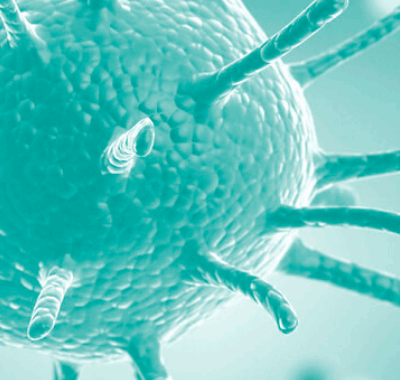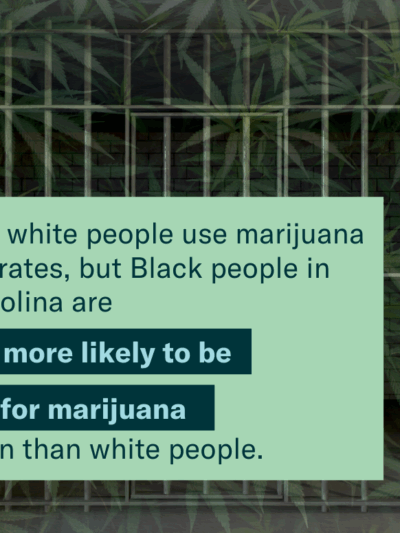News & Commentary
Apr 21, 2020
We're Suing for Release of Incarcerated People Most Vulnerable to COVID-19
On April 9, we sent a letter calling on Governor McMaster to immediately mandate a prison reduction plan and protect incarcerated people from the perilous risks associated with COVID-19 in correctional settings. Despite the recommendations of public health experts and pleas from concerned advocates and loved ones of incarcerated people, Governor McMaster has continued to neglect his duty to care for people in custody -- including those who are most at risk of becoming critically ill or dying from COVID-19. We're suing to prevent death by incarceration. Along with our pro-bono partners at international law firm Arnold & Porter, we filed a federal lawsuit this evening against Governor Henry McMaster, South Carolina Department of Corrections Director Bryan Stirling, and members of the South Carolina Board of Pardons and Paroles. Protection and Advocacy for People with Disabilities, Inc. (P&A) also joined the lawsuit as a plaintiff on behalf of incarcerated people with disabilities.

Apr 19, 2020
It's Time for South Carolina to Change its Marijuana Laws
A new ACLU report released today documents how South Carolina’s marijuana laws needlessly ensnare tens of thousands of people -- disproportionately Black people -- in its criminal justice system every year. Sold to the public in the name of public safety, these laws do not make us safe and ruin lives.South Carolina has the second highest arrest rate for marijuana possession in the United States. Every 15 minutes somebody is arrested for possessing marijuana in South Carolina - a substance that is legal or decriminalized for personal use in 26 states and the District of Columbia.South Carolina’s current marijuana laws are a monumental waste of tax dollars. For each of the 34,229 marijuana arrests in 2018, our tax dollars had to pay for a judge, a clerk, law enforcement officers, solicitors, and others to process the case. According to an economic analysis published in 2013, the 16,669 marijuana possession arrests in 2010 cost South Carolina taxpayers nearly $50 million. Between 2010 and 2018 the number of marijuana possession arrests more than doubled, meaning South Carolina taxpayers may be paying closer to $100 million each year to enforce outdated and harmful marijuana possession laws.South Carolina’s marijuana policy is another example of its two-tiered justice system. Two people can be arrested for possessing the same amount of marijuana and face vastly differing punishments based on nothing more than their wealth. This is because access to diversion programs, which can mean the difference between having a criminal conviction and a clean record, often require fees to participate. As a result, those with wealth can pay their way to a clean record, while those without wealth are stuck with a criminal record and all of its collateral harms.And, South Carolina’s marijuana laws, like all aspects of its criminal justice system, are enforced with a staggering racial bias. In 2018 Black people were 3.5 times more likely to be arrested for marijuana possession when compared with whites, despite both groups using marijuana at roughly the same rate. And, this disparity is on the rise, up from 1.8 times more likely to be arrested in 2001 to 2.8 times more likely to be arrested in 2010. The discriminatory enforcement of South Carolina’s marijuana laws means that Black people are more likely to face the immediate harms of a marijuana possession conviction, including potential incarceration, criminal records, the loss of jobs, housing, financial aid eligibility, and child custody.The discriminatory enforcement also compounds the harms that already exist because of the racial wealth divide - a divide born from slavery and maintained though racist policies including regressive taxation, lending and pay discrimination, and unequal education, to name a few. White families in the United States have a median household wealth of $171,000 while Black families median household wealth is just $17,600. Because of this vast economic inequality, the reduced ability to participate in a diversion program and the collateral harms of a marijuana conviction, including its associated fines and fees, disproportionately push Black people into cycles of never ending debt, poverty, and further contact with the criminal justice system.It’s time for our communities to define and advance our vision for what a just, equitable, and safe South Carolina should look like. And, part of this vision must be the legalization of marijuana with racial equity at the foundation of such reform.

Apr 16, 2020
Law Enforcement Can Help Limit the Spread of COVID-19 + Toolkit for Community Action
Covid-19 is spreading in prisons and jails throughout the United States and South Carolina is not immune to this trend.People in prisons and jails are at heightened risk of contracting and dying from COVID-19. They are housed in close quarters, and are often in poor health and physically unable to follow the social distancing guidelines.South Carolina should be doing everything in its power to reduce the number of people currently incarcerated, and thankfully some counties are doing this.Yet, while some judges, solicitors, and law enforcement leaders in South Carolina have recognized the need to reduce the number of incarcerated people in their jurisdictions, Governor McMaster has issued a number of executive orders that could upend this progress.Many of the Executive Orders issued in response to the COVID-19 outbreak include provisions that expand police powers. These expanded powers lack clear definition and have raised serious concerns from vulnerable community members.While individual rights may give way to the greater good during a disease outbreak, the use of any measure that deprives individuals of their liberty must be scientifically supported and proportional. Some provisions of Governor McMaster’s Executive Orders fail to meet this basic test.Many of these provisions ask law enforcement officers to enforce criminal laws without clear guidance and/or proper training. For example:

Apr 01, 2020
Probation and Parole Officers Should Do Their Part to Prevent the Spread of COVID-19 in South Carolina
According to a statement released by the National Association of Probation Executives and 50 current and former probation and parole executives from across the country, probation and parole agents should “do all [they] can in this crisis to make sure [they are] not inadvertently spreading the COVID-19 virus.”As the number of South Carolinians infected with COVID-19 continues to grow, it is imperative that the South Carolina Department of Probation, Parole and Pardon Services (DPPPS) do their part to prevent the spread of COVID-19 in the criminal justice system.We sent a letter today calling on DPPPS Director Jerry Adger to enact the following policies, also recommended by the Vera Institute of Justice:

Mar 28, 2020
SC Corrections Officials Must Respond to COVID-19 With Transparency
As the number of South Carolinians infected with COVID-19 continues to grow, we must focus on efforts to protect the health and well-being of all people housed and working inside South Carolina correctional facilities. An outbreak inside these institutions will be immensely difficult to contain and will compromise broader public health through transmission from employees who enter and exit the facilities on a daily basis.As of March 27, the South Carolina Department of Corrections (SCDC) has reported that one of its guards tested positive for the virus. Now more than ever, SCDC and other state corrections institutions must increase transparency and accountability to a response grounded in science and public health. Last week, the ACLU of Ohio asked Governor DeWine and the heads of Ohio’s state prison and youth systems to publicly answer several questions on a daily basis to ensure transparency and provide reassurance to the loved ones of corrections employees and incarcerated people. In less than twenty-four hours, the governor and state corrections agencies began posting the requested data and updating it daily. We are following our Ohio colleagues’ lead. Yesterday, we issued a request to SCDC, the South Carolina Department of Juvenile Justice, and Governor Henry McMaster to answer the following four questions daily on their public websites:

Mar 10, 2020
COVID-19 Recommendations for Prison and Jail Officials
People involved in the criminal legal system face heightened risk of COVID-19 infection. We urge South Carolina prison and jail officials to immediately develop evidence-based and proactive plans for the prevention and management of COVID-19 in their facilities.

Mar 07, 2020
South Carolina Must Stop Shackling Pregnant People Who Are Incarcerated
Last week, South Carolina Senators voted unanimously to advance legislation seeking to limit the types of restraints used on pregnant people who are incarcerated and virtually abolish the practice of shackling people during labor, childbirth, and postpartum recovery. The legislation will return to the House of Representatives with a new amendment which would further expand protections for pregnant incarcerated people.If passed as amended, South Carolina’s prisons, jails, and work camps would be required to provide access to adequate nutrition and a bottom bunk and would be prohibited from holding pregnant incarcerated people in solitary confinement under most circumstances. The amendment also requires prisons, jails, and work camps to ensure the availability of menstrual hygiene products for all people under their care with an active menstrual cycle and mandates that these products be made available at no cost to those who cannot afford to pay. Additionally, the Department of Corrections would be required to authorize weekly contact visits between incarcerated people with low or minimum-security classifications and their children.The practice of shackling incarcerated people while they are pregnant, in labor, giving birth, and recovering from birth has been opposed by the nation’s leading experts in maternal, fetal, and child healthcare, including the American Congress of Obstetricians and Gynecologists (ACOG), the American Medical Association, and the American Public Health Association. Additionally, the Federal Bureau of Prisons, U.S. Immigration and Customs Enforcement and the American Correctional Association have all adopted policies to limit the use of shackles on pregnant people who are incarcerated. Across South Carolina, criminal justice and reproductive health advocates have come together to support this legislation. The organizations include the ACLU of South Carolina; ANSWER Coalition; the Association of Women’s Health, Obstetric, and Neonatal Nurses (AWHONN); the South Carolina Perinatal Association; Justice Carolina; and the Women’s Rights and Empowerment Network.We are thrilled to be one step closer to ending the cruel and inhumane practice of shackling incarcerated people during labor, childbirth, and postpartum recovery and we urge the South Carolina House of Representatives to pass this legislation as amended and greatly increase the likelihood of positive outcomes for parents and their newborn children.

Stay Informed
Sign up to be the first to hear about how to take action.
By completing this form, I agree to receive occasional emails per the terms of the ACLU’s privacy statement.
By completing this form, I agree to receive occasional emails per the terms of the ACLU’s privacy statement.
